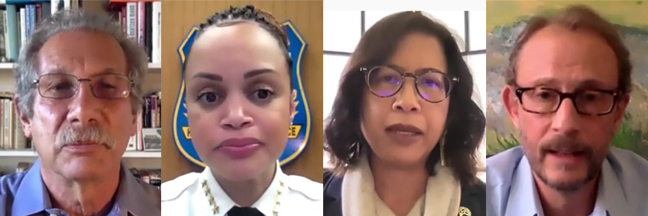
In response to the murder of George Floyd, the Goldman School of Public Policy at UC Berkeley held a webinar on February 23rd to discuss police reform and funding. This was one of many “Reimagining Democracy” town halls held by the school.
Following the uprise of national outrage about ongoing police brutality, Dan Lindheim, professor at the Goldman School of Public Policy, asked panelists Nikki Fortunato Bas, Jack Glaser, and Danielle Outlaw to address several topics. They discussed the meaning of abolishment and defunding the police in relation to the disproportionate levels of crime and violence that affect low-income communities of color.
Philadelphia chief of police, Danielle Outlaw, brought forward statistics from a Philadelphia poll showing majority support for reform rather than abolishment or the reduction of department size. These statistics indicated that 45% of residents would prefer more of a police presence. Outlaw said that many of the calls police respond to should be handled by other agencies. But while these social services and community-based organizations need more financial support, she said, it should not come from police budgets.
“And it’s gonna take everyone in our community to come to the table with solutions,” she said.
Nikki Fortunato Bas, President of the Oakland City Council and co-chair of Oakland’s Reimagining Police Taskforce, said that one of the many steps to fostering an effective public safety system is through accountability and transformative safety solutions. Alternative responses to non-violent calls are vital in increasing the safety and well-being of our communities. She added that the discussion of the policing crisis goes beyond police departments and is connected to the federal government’s dismantling of the social safety net long before ‘policing’ became a national conversation.
“BIPOC (Black, Indigenous, People of Color) communities have been nationally overpoliced and under-resourced,” Bas said.
She pointed out that in the city of Oakland’s budget, only 2.4% goes to parks and recreation, 2.3% to human services, while the policing budget stands at 44%.
“Study after study shows that [investments in] a living wage, access to holistic health services and treatment, educational opportunities, and stable housing are far more successful in reducing crime than incarceration,” Bas said.
As a leading national expert on police bias and police reform, Jack Glaser, professor at the Goldman School of Public Policy, brought forward evidence of the clear bias that lies within the policing system. He stated that police have a particular responsibility, and this responsibility is deeply affected by the human condition of bias. In proactive policing, like investigative pedestrian and vehicle stops, racial bias finds a foothold and causes disparities.
“White people who are searched by police are typically more likely to yield contraband or weapons than Black and Latino people.” This suggests that BIPOC are viewed with more suspicion, Glaser said.
He said that these disparities in policing can be eliminated, and that the community must stay involved and continue the discussion of bias in policing.
To see the complete webinar click here: https://www.youtube.com/watch?v=dbNHr0IOOP8
–Sophia Kerievsky
All League News

